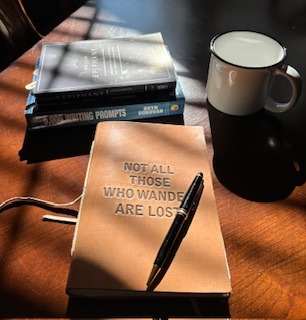Most writers are familiar with writer’s block. It is the painful moment when words no longer flow freely on the page. For me, writing fiction has always been an oasis, a safe place to explore my thoughts and feelings. When I first started writing, I wrote only for myself, scribbling in notebooks or on scraps of paper. With no one to judge my work, my ideas flowed like a roaring river.
Then, I enrolled in a low residency MFA to hone my craft and challenge myself to complete the novel in my head. For the two semesters, I wrote at a prolific pace, writing book annotations of other author’s work and submitting a few chapters of my own.
But when I began my thesis semester, writer’s block kicked in. No longer writing solely for my pleasure, I struggled with self-doubt, spiraling into negative self-talk and comparisons to others. Workshops became more than conversations with like-minded friends but serious critiques of my work. Add my perfectionistic tendencies to the mix, and I procrastinated with Netflix with a glass of red wine. The more I avoided writing, the more my anxiety increased. I tried everything from long walks to yoga and bowls of cookie dough ice cream, but nothing helped. Well, maybe the ice cream helped a tiny bit.
But then, during an MFA Residency Workshop, an instructor introduced me to Morning Pages, a ritual derived from Julia Cameron’s book, The Artist’s Way. The idea is to write three long-hand pages to purge the stuff in your head to create room for creative ideas that pop up throughout the day.
The concept seemed simple enough until I tried it for seven days. Every morning, I put my thoughts, fears, and anxieties on the page. But the more I wrote, the more I felt like a fraud, indulging in artistic self-help exercises while ignoring the elephant in the room – impostor syndrome.
As an unpublished author in an MFA Program, it was terrifying. What if I paid the tuition money and failed?
Frustrated, I flipped the script on Morning Pages, opting for writing prompts rather than scratching old wounds. Each morning, I took out my notebook and selected a writing prompt from 5,000 Writing Prompts by Bryn Donovan or The 3 A.M. Epiphany by Brian Kiteley, depending on my mood.
After a few days, words and ideas flowed freely, like when I first scribbled ideas into notebooks. My usual three pages turned into six, and fifteen minutes became half an hour. My penmanship was jagged, inconsistent, and often illegible, but I didn’t care. Dabbling in various genres and styles, I discovered strong female characters, tough obstacles, rich settings, and humor. My characters became my teachers, giving me the courage to tackle my thesis.
So, what were the biggest “aha” moments in my Morning Pages My Way process?
- Writing three pages a day wasn’t always comfortable. Some days, I struggled to get words on the page, but I gained confidence and perspective along the journey.
- An imaginary world was safer for self-discovery, using my characters as guides and teachers rather than myself.
- Epiphanies about my work came two to three days after completing a writing prompt.
- I am a fast thinker, jumping to the day’s challenges as soon as the alarm goes off. In the morning, writing stopped the hamster wheel in my head, leaving me calmer and feeling like the day was manageable.
- I am a writer, and I belong with other writers.
Writing three pages a day might feel awkward at first, but stay with it. The more you write, the easier it gets. For me, the process gives me the confidence to face the day. Rather than feeling like an impostor, I face my work confidently and objectively.
Try it! What’s to lose? If it doesn’t work, there is always ice cream. 😊
[Photo Credit: Nanette Gamily]

Nanette Gamily is a crime fiction writer, a Regis University MFA graduate, a Tin House Residency finalist, and a guest blogger for RMFW. She is currently editing her debut novel with her agent. You can follow her on X, Instagram, and Threads at @nanettegamily.


LOVE this and LOVE The Artists Way, and anything by Anne Lamott – good for you!
Thank you! I am so glad you enjoyed it.
The imposter syndrome is so real. I’m glad you found a way to combat it!